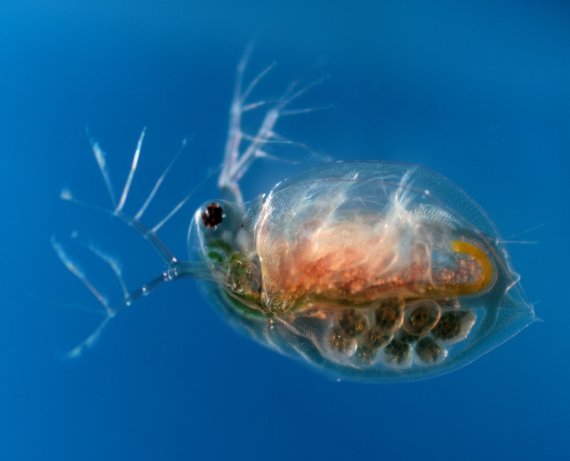Watervlo onder de microscoop © Shutterstock
The larvae of flies and mosquitoes eat water fleas, but they cannot digest their hard skeletons and spit them out, a bit like an owl pellet. ‘This releases substances known as kairomones, which cause other water fleas in the vicinity to grow teeth in their necks that prevent the larvae from eating them,’ says Bauke Albada of Organic Chemistry. For a long time, the exact identity of these substances was a mystery, until Albada and his colleagues in Germany and the UK figured it out. They published their results in Nature Chemical Biology.
The researchers put water fleas and larvae in a pot and left it alone until all the fleas had been eaten. Then they analysed which substances were present in the water and compared that with the substances in water which had housed only fleas, only larvae, or neither of the two. From those differences they could deduce which substances were probably involved in the formation of neck teeth. ‘And we knew from previous research that we were looking for a small, relatively simple molecule,’ says Albada.
The researchers were eventually left with a few potential candidates. They then replicated these ‘suspect’ substances in the lab, and tested them one by one on the water fleas to see whether they grew teeth. It turned out that not just one but several substances played a role in this. And that all the substances contained the amino acid glutamine.

The substances are only present when a water flea is eaten. So if you crush a water flea, you will not see the teeth.
Bauke Albada, Organic Chemistry
Complex network of signals
These results can be used in all kinds of other research, says Albada. ‘Chemical signals are very important, especially for creatures that lack good vision. Water ecosystems consist of a very complex network of signals of this kind.’ He sees a possible practical application, too: ‘Theoretically, you could imitate these substances in a more stable form and add them to water in higher concentrations so that mosquito larvae are starved of food. No more mosquitoes.’
A: a flea without teeth. D: the neck teeth © Linda Weiss
Also read:
‘My whole life is a gift’ – Han Zuilhof, the philosophical chemist
Mussel molecule provides insight into building with DNA
Fishing phosphate out of wastewater

